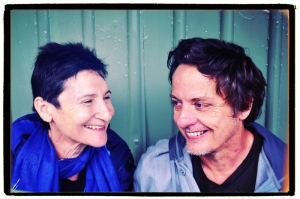 I met Jo Dorras & Peter Walker in a bunk house on the side of a mountain in New Zealand. In between playing A LOT of cards and nursing our aching limbs, we traded stories and I found out about their amazing work in Vanatu in the South Pacific.
I met Jo Dorras & Peter Walker in a bunk house on the side of a mountain in New Zealand. In between playing A LOT of cards and nursing our aching limbs, we traded stories and I found out about their amazing work in Vanatu in the South Pacific.
Over 20 years ago they set up a theatre company, wansmolbag. What began with 15 amateur actors has grown into an organisation specialising in development theatre with 100 staff and over 400 volunteers. They use drama to engage audiences on a range of issues from contraception to corruption. One of their biggest hits has been Love Patrol, a TV series centred on a police detective that focuses on HIV/ AIDS. Vanuatu’s first TV serial has been roaring success; it has been broadcast across the region, from Fiji to New Zealand and is now in its fifth series. Jo writes it, Peter directs it. I thought it was only fitting to feature them as a couple!
THIS YEAR’S LESSON: Jo: Never think you know yourself. Circumstances make or unmake the woman. It can be very hard to explain why you did what you did.
Peter: What everybody in their fifties starts to learn: that time speeds up. I remember sitting around with both sets of parents about 15 years ago, before my parents embarked on a dreadful last decade of illness. One night they started discussing their attitude to death and how it wasn’t worth worrying about. My father in-law, Harry, mentioned how time went so fast, chortling as he remembered some old celebrity in the paper saying how it seemed like breakfast came round every fifteen minutes. The good side — especially if you are privileged enough to enjoy your work, and your partner is doing the same work — is that you savour each opening night, each great rehearsal and also each weekend bush walk, with the knowledge that the years you will be able to do them are starting to dwindle — although I don’t feel that breakfast is coming round every fifteen minutes (perhaps only every half hour!)
THE BURNING QUESTION: Jo: As poverty is the cause of most of the world’s pain and suffering, can aid — which pays our own personal bills — do anything about it? And what will happen to all the young people at our centre when they are no longer appealing youth we are all meant to worry about, but men and women with nothing?
Peter: Just how is Vanuatu going to escape the ravages of an ever more venal group of politicians? One would like to believe that in this, an election year, it would be via the ballot box. But, as the theatre group discovered last month when touring with plays pertinent for an election year, the amount of money, saucepans, fencing materials and solar panels being delivered to villages by politicians wanting to hold on to power suggests that we’re stuck with the lot we have and the weekly stories of corruption they bring with them. But here’s hoping… the after-play-discussions bring to the surface a great deal of discontent.
THIS YEAR’S INSPIRATION: Jo: The amazing Gigi, who plays Andy in ‘Love Patrol’. He’s a young gay man and was absolutely thrilled on his return from launching series 4 of LP in Cook Islands, where he was treated like a star and ran workshops with school children, communities and queens (the third sex group there). It’s not always like that for Gigi.
And always writing for the actors and seeing them take what I write and fly with it! Wow!
Peter: Read: Peter Godwin’s The Fear about the 2007 elections in Zimbabwe. We lived in the south east of Zimbabwe for 5 years in the 80s and went back in the mid 90s for a visit. So the wreckage described was perhaps even more poignant for us. The stories both of man’s unbelievable inhumanity to man and also the staggering bravery shown by many in standing up to the torture and general mayhem, just have you gasping on every page. Unavoidably we ran into diehard white farmers when we lived there. I remember 300 km hitchhiking car journeys, when they picked you up (aghast that you should be hitching), and put you straight about how their country really was. Some of these same people, by their own admission in the book, have made incredible journeys to end up side by side with their black Zimbabwean colleagues.
Seen: The youth group we are currently working with! 26 of them, most of school age, none of them in school…..their absolute delight in the rehearsals. The other night they did a run through of something they’d been working on since the last time I’d seen them. They finished. I said I thought it was good and they clapped and cheered, so pleased were they that I had liked it.
Heard: Stories on the BBC World Service series ‘Witness‘




